#peninsularity
Text
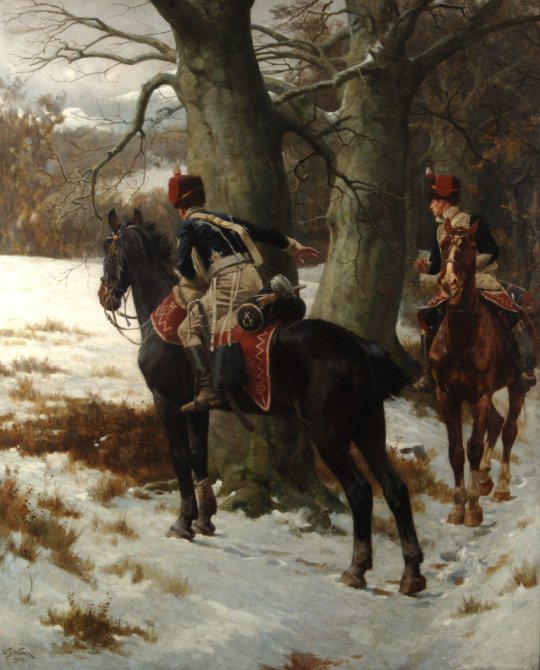
The Scouts (A patrol of the 10th Light Dragoons, Peninsular War)
by William Barnes Wollen
#william barnes wollen#art#peninsular war#napoleonic wars#scouts#dragoons#hussars#great britain#britain#england#british#english#cavalry#history#spain#europe#european#dragoon#hussar#napoleonic#royal hussars#royal#iberian peninsula
240 notes
·
View notes
Text
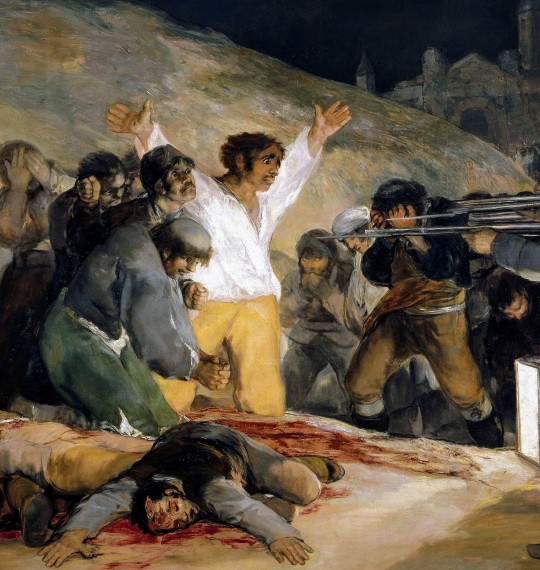
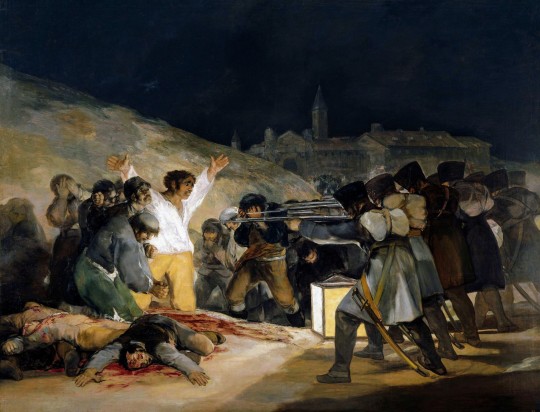
Francisco Goya El tres de mayo de 1808 en Madrid (The Third of May 1808). 1814. Oil on canvas: 268 × 347 cm (106 × 137 in).
#francisco goya#war#napoleon#1800s#horror#madrid#spain#19th century#history#dark#art#politics#art history#peace sign#painting#macabre#oil painting#chaos#culture#peninsular war#disasters of war#🎨 📚
471 notes
·
View notes
Text
I try not to idealize even my favorite historical figures. Especially if these figures are military men.

Ney punished the Spanish guerrillas very cruelly during the Peninsular Wars, and this cannot be denied. So I wanted to draw this.
This does not mean that I do not like the historical figure I have chosen. Ney is a very important person for me, who has seriously influenced my life, but I try not to idealize him.


#art#history art#napoleonic#michel ney#marshal ney#french history#19 century#history#Peninsular Wars#tw blood#tw death
108 notes
·
View notes
Video
The Official Field Greeter to Katmai National Park by Mark Stevens
Via Flickr:
this is chunk (bear 32.) he was the first bear seen when they turned on the explore.org bear cams the other day at brooks falls in katmai. this pic was taken that day. I have been checking the cams constantly since they were turned on and was lucky enough to see chunk and I was surprised how fat he is already and how good he looks, bear force one ( 747 ) has also been seen in the last week before the cams were tuned on and reportedly looks great. the salmon have not yet begun to run so the bears are scarce so far but keep checking because once the salmon appear so will lots of bears and it will happen soon and quickly. I will post a link to the bear cams ~ johnny
#Alaska 2019#Alaska Peninsula Brown Bear#Alaska Peninsula Ranges#Alaska-Yukon Ranges#Aleutian Ranges#Azimuth 51#Bear in Water#Brooks Camp#Brooks River#Brown Bear#Day 13#DxO PhotoLab 3 Edited#Falls Platform#Image Capture With Arsenal#Katmai#Katmai National Park & Preserve#Katmai National Park and Preserve#Landscape#Landscape - Scenery#Looking NE#Nature#Nikon D800E#No People#Outside#Peninsular Grizzly#Portfolio#Project365#River#Scenics - Nature#Trees
57 notes
·
View notes
Text
Napoleon and Wellington on Junot's actions at the Convention of Cintra

At the Convention of Cintra in 1808, General Jean-Andoche Junot managed to convince the British forces who had captured his army in Portugal to not only allow him to return to France with all of his weapons and loot, but for his army to be taken home on British ships.
Despite the fact that Britain had defeated the French, the bizarre terms of this agreement caused the Convention of Cintra to be seen by many as a French victory.
Napoleon wrote a letter to Junot saying the following:
"You have done nothing dishonourable; you have returned my troops, my eagles and my cannons, but I certainly hoped you would do better...you have won this convention by your courage, not by your dispositions; and it is with reason that the English complain that their generals signed it..."
When questioned on his thoughts on Junot's retreat in a government enquiry into the Convention of Cintra, Arthur Wellesley, future Duke of Wellington, said this of the enemy general:
"When I considered the expediency of allowing the French to evacuate Portugal by sea, I took into consideration the British interests and British objects only, and the objects of their allies, as connected with those of Great Britain. I considered that the French army, from the relative situation of the two armies in Portugal, and from its having the military possession of the country, had a fair military right to withdraw by sea with their arms and baggage; I do not think it necessary for me to account for the motives of General Junot in preferring to evacuation by sea to another line of operation; which, without wishing to say anything personally disrespectful of him, might have bad or unworthy motives, as well as views for the interests of his country."
source
#napoleon#napoleon bonaparte#jean andoche junot#arthur wellesley#duke of wellington#wellington#napoleonic era#napoleonic wars#peninsular wars#history#French history#convention of cintra
37 notes
·
View notes
Photo
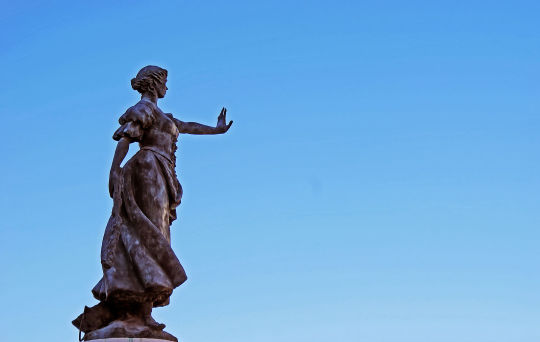
(Photo: Carmen Escobar Carrio)
Juana Galán - Heroic guerrillera
When the French invaded Spain during the Peninsular War, some women were determined to resist. Among them was Juana Galán (1787-1812), the daughter of a prosperous tavern keeper.
On June 6, 1808, a column of 1,000 enemy troops attacked the town of Valdepeñas. Juana rallied the townswomen under her command. They manned the windows and threw boiling water and oil at the enemy.
Juana went to the street armed with a club. She reportedly pulled several French soldiers from their horses and dispatched them with a blow to the head. The townspeople’s fierce resistance forced the French to retreat and never return.
Juana didn’t live to see the end of the war. She died in 1812 while giving birth to her daughter. Her legacy lives on and she was made a local heroine and a symbol of resistance. She now has her own monument in Valdepeñas.
Like Juana, other women fought in desperate situations or during riots, sometimes with improvised weapons. In 1809, an unnamed woman armed with a sword rallied the inhabitants of Penafiel (northern Portugal) and led them in battle against the raiders. In 1811, María Marcos, a tavern keeper from La Palma del Condado, played a key role in repelling a small group of French soldiers.
There were also cases of women involved in guerrilla warfare. The Catalan Somatén, a paramilitary defense organization, had female members such as María Escoplé, Magdalena Bofill, Margarita Tona, María Catalina and Catalina Martín. Francisca de la Puerta reportedly fought in Extremadura and commissioned the Junta of her province for permission to form her own guerrilla band.
Wanting to avenge her father and brother, Martina de Ibaibarriaga Elorriagafora disguised herself as a man and led a guerrilla band until she gained a commission in the Spanish army. An unnamed woman was given the command of a troop by the Junta of Molina de Aragón in 1809. A British officer also mentioned women serving with bands of irregulars as active combatants.
For more heroines of the Peninsular War, see Agustina de Aragón.
Feel free to check out my Ko-Fi if you want to support me!
Further reading
Esdaile Charles J., Women in the Peninsular War
Sheldon Natasha, “Juana Galan: A Spanish Heroine of the Peninsula War”
#Juana Galán#history#women in history#spain#spanish history#peninsular war#napoleonic wars#19th century#women's history#warrior women#war#women warriors#historyblr#badass women#historicwomendaily#historical ladies#warriors
71 notes
·
View notes
Text
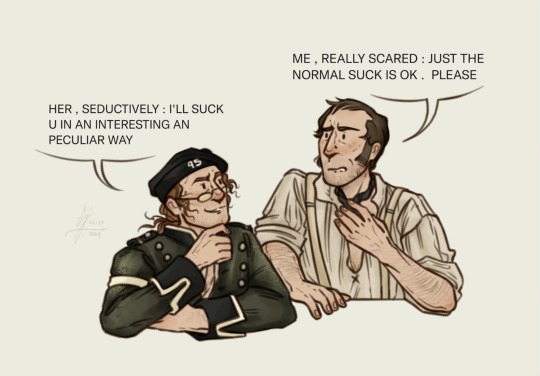
"more than incidentally homosexual"?
#em draws stuff#em is posting about sharpe#sharpe#rifleman harris#francis cooper#I have been thinking about them to the tune of this tweet in a frankly Mind-Consuming manner I shall admit!#this is sort of an outtake for my 'kissing the homies goodnight' fic (still in progress at present)#but now I kind of want to write an epilogue wherein they are fuckin on each other in a mutually unsatisfying bro-ish way#a small herd of kinsey twos go to the peninsular wars...#either way I think that anything harris does with anyone would end up Peculiar as he is incapable of doing anything Any Other Way#...if you want an idea of the drawing process for this image picture me Blasting depeche mode and doing a Wizard Cackle for Several Days
56 notes
·
View notes
Text
Soo… I was deep in my research of the Peninsular War, Dos de Mayo and Francisco de Goya’s life during the war, as he is actually a very important character in the story I mentioned in an earlier post asking for advice on sources.
Btw, the story used to be called The House of the Deaf Man, but I’ve since changed it to “By the Maestro’s Side” for REASONS ™️.
(Also, yes, I am the kind of person working on several pieces of writing at once and I don’t forget them, I promise.)
Anyway, I was researching Goya’s illness and subsequent deafness (he went completely deaf in the 1790s, causing a drastic change in his art and personality) and I found this:

This is an etching from 1812 attributed to Goya, and it’s called “A Study of Hands”, which might seem like just a study done by the painter because hands are a fucking bitch to paint.
However, take a look at this:

This is the Spanish dactylology alphabet (spelling of words via signs). Notice the similarities?
While pop culture tends to portray Goya as verbal and reading lips (which is much harder to do in reality btw) whenever he is portrayed in literature or in film, I think the etching is a bit of a window into his ways of communicating, or at least into his exploration of the options of communication.
My research has, in fact, yielded some information about Goya using dactylology historically on multiple occasions, aside from reading lips and writing. And this has given me ideas for some plot points too.
But yeah! Glad to have discovered this etching and take a deeper dive into the history of sign language and means of communication.
#history#art history#etching#francisco goya#fransisco de goya#goya#deaf artist#deaf history#sign language#dactylology#by the maestro’s side#peninsular war#napoleonic era#napoleonic wars
25 notes
·
View notes
Note
What was Murat’s exact role in the Peninsular War? So far, according to my research of the SPANISH resources, he doesn’t appear to be nearly as hated as I expected…
He wasn’t a part of the Peninsular War for very long. He was sent to Spain in February 1808 to act as Napoleon’s lieutenant (as in, acting in lieu of Napoleon, and not the actual rank of lieutenant) at a time when the political situation in the country was becoming unstable because of the Spanish King’s unpopular favorite minister, Godoy. Murat oversaw Charles IV’s abdication and the brief accession of his son Ferdinand, who then in turn abdicated at Napoleon’s command in May. Basically Murat was supposed to try to keep things stable until Napoleon made up his mind as to how he wanted time handled Spain, which of course he ultimately gave to his brother Joseph. Once Murat left Spain in July 1808, he never returned.
18 notes
·
View notes
Text


Peninsular Bighorn Sheep Ovis canadensis nelsoni
7/8/2023 San Diego Zoo Safari Park, California
#bighorn sheep#peninsular bighorn sheep#bovidae#ungulates#mammals#captive animal#san diego zoo#san diego zoo safari park#zoo animals#zoo#zoo photography#photography#photographers on tumblr#original photography#nature photography#my photos
11 notes
·
View notes
Text
The Spanish Series: El Dos De Mayo 1808 - Francisco Goya (1814)
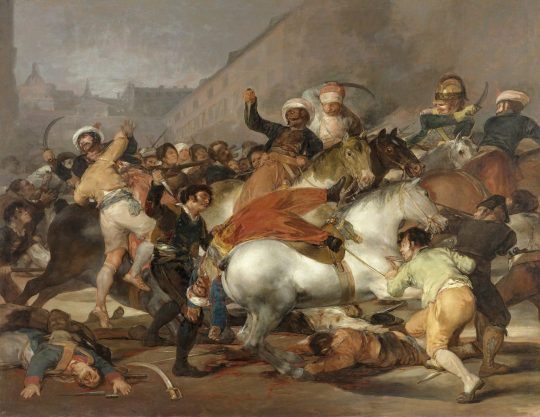
"There was an insurrection in Madrid on May 2. Thirty of forty thousand persons assembled in the streets and in houses and fired from the windows. Two battalions of fusiliers of the Guard and 400 or 500 cavalrymen brought things back to normal..."
Letter by Napoleon Bonaparte to his son, 6 May 1808
In the French emperor's view at the time, the 2nd of May was a disaster for the Spanish rebels. He would quickly learn that it was in reality a disaster for him. The ensuing Peninsular War became the disaster before the disaster of Russia, the straw that only fractured the camel's back.
One particularly interesting aspect of Goya's painting is the amalgamation between the rebels and the French soldiers. It is somewhat difficult to tell which side will emerge victorious, as one can see both French soldiers and Spaniards lying on the ground in pools of blood. The painting is chaotic, disorderly, and almost overt in its graphic depiction of gore.
Perhaps what Goya truly wanted to do was paint a very real form of war at its worst. The battles of the Napoleonic Wars were often painted with a more orderly manner of warfare, in which Napoleon sat on his horse, victorious above the fallen soldiers of the Coalition.
#spanish art#napoleon bonaparte#napoleonic wars#oil on canvas#oil painting#art#art history#francisco goya#peninsular war#painting#history
22 notes
·
View notes
Text

Conquered but not Subdued by Richard Caton Woodville Jr.
#richard caton woodville jr#napoleonic wars#art#prisoner#napoleonic#highlander#highlanders#cavalry#peninsular war#british#scottish#french#spain#france#britain#great britain#scotland#england#europe#european#history#chasseurs#chasseur#hussars#hussar
150 notes
·
View notes
Text

1814 portrait miniature of Lieutenant John Trumbull Ray, by artist Andrew Robertson. A Peninsular War veteran of the Napoleonic Wars in the British Army, he served under Lt. Gen. Sir Arthur Wellesley, Duke of Wellington, and was wounded first during the Siege of Badajoz and, later, at the Battle of Salamanca.
#napoleonic wars#john trumbull ray#british army#redcoat#dressed to kill#1810s#military history#napoleonic#also he was the illegitimate son of patriotic usamerican artist john trumbull#very awkward whoops#his dad was worried he might fight in the war of 1812 but that didn't happen#but many peninsular veterans also fought in north america#portrait miniature#andrew robertson
32 notes
·
View notes
Text
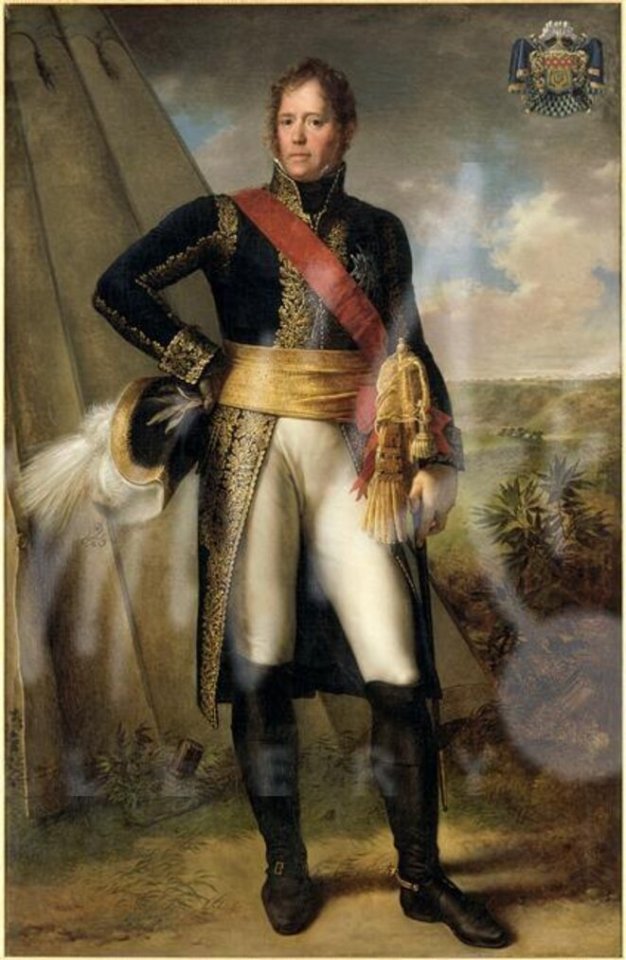
😥 I was working long hours and took even longer to get to work (due to train strike), so I missed Marshal Ney’s birthday. I’m so sorry! I had planned to translate something special, and I hope it’s still a bit of a present even if it’s a day late.
In summer of 1809, while Soult was still licking his wounds after the disaster in Oporto, anxiously waiting for Napoleon’s judgement and trying to defend himself against all the rumours that accused him of high treason, all the while doing his best to bring Joseph and Jourdan to some action against Wellington - guess who at the same time came to Galicia to pay Michel Ney a visit? Right, Ney’s most devoted Dutch fan girl, Ida Saint-Elme! And it’s a particularly romantic part of her recollections, which were published as "Mémoires d’une Contemporaine":
Ney, who was hardly resting either, had just subdued Galicia.
Okay, Soult already wants to protest against this claim, but let’s ignore him. Please, Ida, go on:
I joined his corps at Banos, forty-eight hours before he came face to face with the English army, which the Marshal completely defeated.
Already the spectacle of war, meeting the French battalions, the scent of glory, sweeter to breathe in this country than that of the orange trees that embalm it; this active life, animated entirely by emotion and spectacle, revived my imagination weary of the empty pleasures of the courts and of voluptuous Italy. I felt I was in my element: I was close to Ney, close to the heart that alone could make mine beat. I was happy just to know that he was so close to me and to tell him that we were barely a league apart. Here is the note I received in reply to mine:
"Since it's your taste to have an arm or a leg less, hop on a horse and come here."
As I read this short, military invitation, I jumped in the saddle and rode off.
I had hardly gone a quarter of a league when I met him, and I read in his beaming face all that his note had not told me, the joy of seeing me again, which was the reward for my journey and happiness itself. I have forgotten the names of the places we passed through, but it seems to me that I have never seen a more enchanting place, a more beautiful sky, a sweeter dawn. There was something wild and proud about this rich and picturesque nature.
The road was lined with rocks like a crown. "Here is a magnificent shelter of ravines," Ney said to me, "the tree-lined slopes of which ensure their coolness; let us stop here; you must be in need of rest; we both need to open up and talk;" and here we were, with our horses' bridles slung over our arms, pushing aside the fragrant undergrowth with a vigorous hand, and looking for a retreat that could hear our confidences: it was easy to find in the ravines of Galicia; and, a few hundred paces from the road, we could believe ourselves to be entirely alone in the world. Our horses were quickly tied up, and the secluded spot a little farther on completed the safety of this meeting, so sudden and so little expected. We had been sitting for a few minutes when Ney struck the trunk of an old cedar with his foot, and said to me: "Here, Ida, here is a support for our feet, which will at least save us from a fall;" and, confident in this support so well met, we no longer feared to tread the embalmed moss which served us as a wild divan. I looked at him like one of those figures from a long dream, which the day suddenly shows and illuminates, and which we recognise with all the anxiety and all the troubles of the dream. It's him, though; it's definitely him, I said to myself; I can tell by the glory shining on his forehead, by the pressure of his powerful hand, which is as recognisable as his glory.
Thinking more of the hero than of my love, of the captain needed for his army than of the man needed for my heart, I shuddered fearfully at the thought of this isolation in a country so full of dangers, where a warrior's halt might unexpectedly be surprised by the dagger or bullet of partisans; in a country where hatred of the French name reverberates and watches from mountain to mountain. I felt guilty exposing to these perils, beneath such a great man, a life so dear and so beautiful, that informed assassins could cut it short. It was only a quick thought, but a vivid and gripping one, which, disturbing my thoughts, made me cling tightly to Ney, and as I let out this stifled whisper: "Ney, my friend, let's not stay here; let's go away." - "No, no," he replied, holding me back; "where else would we be, without witnesses to a happiness that I have rediscovered, and which needs solitude and mysterious effusion?" I looked at him with surprise at these words, but with delight, for I was as happy as I was astonished to have remained so dear to him. Never had Ney's face seemed more expressive, never had his looks been more eloquent, never had his words been more intoxicating.
If this was a modern-day AU, this would be the perfect moment for Ney’s phone to ring and for one infuriated Soult to ask why the F he was not receiving any news from Ney’s troops in Galicia. As it was, Ida’s little tête-à-tête with her one-and-only Ney could continue.
At the sight of the security imprinted on the warrior's features, I regained a similar security; there are those moments when everything you feel gives way to everything you inspire. Oh, what inexpressible delights this happiness given by a great man was! Our hearts, separated by such a long time and such long distances, seemed never to have parted, and tasted the pleasure of a similar conviction and an equal sharing of emotions. A new fear came to suspend the enchantment and give it, as it were, all the price of a victory. The reverse side of the ravine which had received us sloped down very rapidly; the trunk of the tree which supported the effort of our feet, a solid yet powerless support, suddenly gave way and broke at the very moment when, immersed as we both were in the rapture of an intimate conversation […]
Listen, it was a conversation, okay? They were only chatting! Intimately chatting!
[…], we had forgotten even the possibility of such a peril, from which Ney's presence of mind and prodigious strength alone saved us: With one hand he seized the branches of the bush that had sheltered us; with the other he pressed and held me violently against him; and, thanks to this struggle, we were able to regain our breath, escape the precipice, and manage to get back to our horses.
I really do not want to know how his aides would have tried to explain the fact that their marshal had fallen into the abyss and to his death while having an intimate conversation. Or why his pants were still up on the cliff...
But if any of the artists out there are looking for inspiration...
Speaking of Ney’s aides, one of them, Levavasseur, in his memoirs has this to say about Ida’s apperance in Spain:
It was at Banos that I saw a French woman arrive on horseback and ask for Marshal Ney. It was the woman who has since called herself la Contemporaine. This woman soon disappeared; what she says about the Marshal in her memoirs is pure invention.
Levavasseur: Don’t you believe what that woman wrote about Ney, she’s a total liar! Besides, she was only with us for a very short time…
But the funniest thing is his casual report on why Ida probably had to leave again so quickly: Ney was already occupied otherwise.
During this trip, the marshal took a tender interest in the duchess; one of my comrades had declared himself the knight of the eldest daughter, and I myself protected the youngest […]
I can’t help but think that the interest the general staff of this army corps was showing to all things female was overly excessive even by French standards… - Wait, what’s that? Oh, another missed phone call for Marshal Ney. Marshal Soult wants to discuss priorities in war times...
45 notes
·
View notes
Video
Along the Shores of the Brooks River (Katmai National Park & Preserve) by Mark Stevens
Via Flickr:
I captured this image at the Lower River Platform with a view looking to the southeast with the Brooks River while observing brown bears in Katmai National Park.
#Alaska 2019#Alaska Peninsula Brown Bear#Alaska Peninsula Ranges#Alaska-Yukon Ranges#Aleutian Ranges#Azimuth 123#Bear in Water#Brooks Camp#Brooks River#Brown Bear#Day 13#DxO PhotoLab 3 Edited#Grassy Area#Grassy Field#Grassy Marsh#Grassy Meadow#Image Capture With Arsenal#Katmai#Katmai National Park & Preserve#Katmai National Park and Preserve#Landscape#Landscape - Scenery#Looking SE#Lower River Platform#Meadows#Nature#Nikon D800E#No People#Outside#Peninsular Grizzly
43 notes
·
View notes
Text
A letter from Wellington to Junot
context:
In 1810-1811, Jean-Andoche Junot was serving in the Iberian peninsular under Marshal Masséna, fighting against the British army led by Arthur Wellesley, later Duke of Wellington. Junot, already suffering great misfortune, received a major wound to the head.
Junot's wife Laure gave birth to their fourth and final child Andoche Alfred Michel Junot on 25th November 1810.
27th January 1811
Monsieur,
I have learned with much sorrow that you have been wounded; and I beg you to let me know if I can send you something which can help with the healing of your wound, or accelerate your recovery.
I do not know if you have had any news of Madame la Duchesse. She has been delivered of a son at Ciudad Rodrigo at the end of November; and she has left Ciudad Rodrigo and has gone to Salamanca in order to go to France in the first days of this month.
I have the honour, Monsieur, to be your obedient servant,
Arthur Wellesley.
source
#jean andoche junot#junot#duke of wellington#arthur wellesley#napoleonic#napoleonic era#napoleonic wars#peninsular wars#history#letters#napoleon
37 notes
·
View notes

